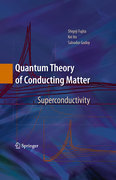
Major superconducting properties including zero resistance, Meissner effect, sharp phase change, flux quantization, excitation energy gap, Josephson effects are covered and microscopically explained, using quantum statistical mechanical calculations. First treated are the 2D superconductivity and then the quantum Hall effects. Included are exercise-type problems for each section. Readers can grasp the concepts covered in the book by following the worked-through problems. Bibliographies are included in each chapter and a glossary and list of symbols are given in the beginning of the book. The book is based on the materials taught by S. Fujita for several courses in Quantum Theory of Solids, Advanced Topics in Modern Physics, and Quantum Statistical Mechanics. The microscopic theory of superconducting properties is explained with step-by-step calculations using quantum statistical methods Unlike competing works, this book shows how the Bose-Einstein Condensation Theory is applied to two-dimensional superconductors and quantum Hall systems Quantum statistical mechanics is used to explain superconductivity and quantum Hall Effect in a unified manner INDICE: Superconductors.- Electron-phonon interaction.- High temperature superconductors.- Doping dependence of Te.- The susceptibility in cuprates.- Quantum hall effects.- The bosonic quantum hall effect.- The fermionic quantum hall effect.- Radiation-induced quantum hall effect.- Summary and prospectus.- Derivation of eqs.- Second quantization.- Derivation of Eu.- Proof of Eq.- TheBEC in 3D.- Laplace transformation.- Operator algebras.- References.- Bibliography.
- ISBN: 978-0-387-88205-5
- Editorial: Springer
- Encuadernacion: Cartoné
- Páginas: 320
- Fecha Publicación: 01/03/2009
- Nº Volúmenes: 1
- Idioma: Inglés
